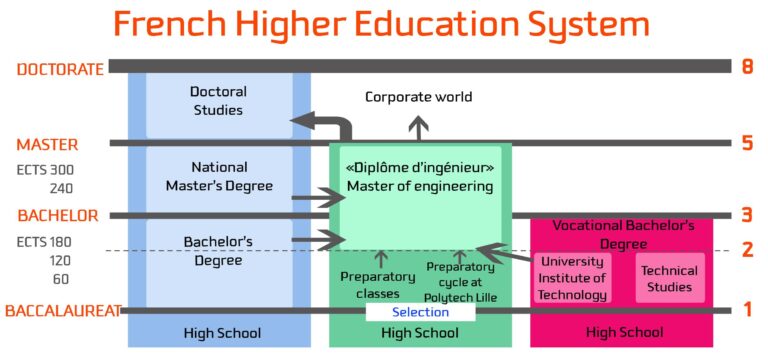France’s education system, known for its rich history and rigorous standards, plays a pivotal role in shaping the country’s future generations. In this comprehensive guide, we explore the key components of schools in France, from early childhood education to higher learning institutions. As families and educators navigate this structured landscape, understanding the pathways, curriculum, and unique features of French schools has never been more essential. This article aims to provide clear, up-to-date insights into the French education system, offering valuable information for parents, students, and anyone interested in the fabric of education in France.
Overview of the French Education Structure and Key Stages
The French education system is carefully structured into distinct stages, each designed to provide a comprehensive and progressive learning experience. It begins with École Maternelle (preschool), catering to children aged 3 to 6, focusing on socialization and basic literacy skills. Following this is École Élémentaire (elementary school), where students from ages 6 to 11 receive foundational instruction in subjects such as French, mathematics, and history. The transition to Collège (middle school) serves students aged 11 to 15, offering a more diverse curriculum that prepares pupils for academic or vocational paths. Finally, Lycée (high school) accommodates learners aged 15 to 18, culminating in the nationally recognized Baccalauréat exam, essential for higher education and professional opportunities.
Key stages within this system are designed to ensure gradual skill development and specialization. For instance, during collège, students encounter core courses along with elective options, allowing early influence on their academic focus. A glance at the following table highlights the progression timeline and learning focus of each level:
| Education Level | Age Range | Primary Focus |
|---|---|---|
| École Maternelle | 3-6 years | Social skills, basic literacy |
| École Élémentaire | 6-11 years | Core academics |
| Collège | 11-15 years | General knowledge, electives |
| Lycée | 15-18 years | Specialized studies, Baccalauréat prep |
- Compulsory education runs from ages 3 to 16, one of Europe’s longest mandatory schooling periods.
- Dual pathways emerge at lycée, offering either general, technological, or vocational streams.
- National curriculum ensures consistency across all public schools while private schools may offer tailored programs.
Curriculum Focus and Teaching Methods in French Schools
The curriculum in French schools is meticulously structured to provide a broad and balanced education, emphasizing core disciplines such as mathematics, French language and literature, history, geography, sciences, and foreign languages. Starting from primary school, students are introduced to a national syllabus that is regularly updated by the Ministry of National Education, ensuring consistency and coherence across the country. Beyond academics, arts, physical education, and moral and civic education are integral components designed to foster well-rounded development. Teachers employ traditional methods like direct instruction and rote learning, but there is a growing trend towards interactive and participatory techniques, encouraging critical thinking and collaboration among students.
Key teaching methods and curriculum highlights include:
- Structured progression: Each stage builds systematically on the knowledge acquired in the previous one, supporting gradual complexity.
- Emphasis on language skills: Strong focus on French with early introduction of second and sometimes third foreign languages.
- Interactive learning: Use of group projects, debates, and digital tools to enhance engagement.
- Assessment diversity: Continuous assessments combined with national exams to track progress comprehensively.
| Educational Stage | Main Focus | Teaching Approach |
|---|---|---|
| Primary School | Foundations in literacy, numeracy, citizenship | Direct teacher-led instruction; collaborative play-based activities |
| Middle School (Collège) | Depth in core subjects, introduction to technology and arts | Interactive lessons; project-based learning; peer discussions |
| High School (Lycée) | Specialization in chosen streams like science, literature, or economics | Lectures, seminars, extensive independent study |
Understanding the Role of Public and Private Institutions
In France, education is delivered through a well-established network of public and private institutions, each playing a distinctive role in shaping the educational landscape. Public schools, managed and funded by the government, guarantee free and compulsory education from primary to secondary levels, emphasizing equal access for all students regardless of their background. These institutions strictly adhere to the national curriculum, ensuring uniformity and high educational standards across the country. Meanwhile, private schools, often associated with religious organizations, offer an alternative that may involve tuition fees but also provide diverse pedagogical approaches and specialized programs.
The coexistence of these two systems provides families with options tailored to their preferences and needs. Here is a quick comparison of core features:
| Feature | Public Schools | Private Schools |
|---|---|---|
| Funding | State-funded | Tuition fees + private funding |
| Curriculum | National standard | National standard + optional variations |
| Student Population | Diverse, inclusive | Varies, often with selective admission |
| Religious Affiliation | None (secular) | Often religious (e.g., Catholic) |
Practical Tips for Parents Navigating Enrollment and School Life
When enrolling your child in a French school, start early and familiarize yourself with the local mairie (town hall) requirements, as registration often involves submitting proof of residence, vaccination records, and previous academic reports. Many schools operate with waiting lists, especially in larger cities, so visit potential schools in advance, attend open days, and communicate directly with school administrators to secure a spot. Understanding the French academic calendar will also help you anticipate start dates, holidays, and parent-teacher meetings, ensuring you are fully aligned with your child’s school rhythm.
Supporting your child through school life requires active engagement and awareness of the system’s unique features. Encourage participation in school activities, as extracurriculars play a crucial role in social integration and language development for non-native speakers. Keep a close eye on homework expectations and consider routine liaison with teachers via the school’s dedicated communication platform, often “cahier de liaison.”
Key aspects to monitor:
- Daily schedules and meal provisions in the cantine (school cafeteria)
- Access to bilingual support or language assistance programs
- Understanding the grading system, which may differ significantly from other countries
| Tip | Why It Matters |
|---|---|
| Early School Visits | Allows you to evaluate environment and meet staff |
| Use “Cahier de Liaison” | Facilitates regular teacher-parent communication |
| Engage in Local Parent Groups | Provides support and valuable community insights |
The Way Forward
In sum, France’s education system offers a structured and comprehensive pathway from early childhood through higher education, deeply rooted in the country’s cultural and historical landscape. Understanding its unique stages, key institutions, and recent reforms provides valuable insight for families, educators, and international observers alike. As the nation continues to adapt to modern challenges, schools in France remain central to shaping the country’s future, underscoring the importance of ongoing dialogue and exploration in education. For those considering studying or living in France, familiarizing oneself with this system is an essential step toward navigating its academic environment successfully.




